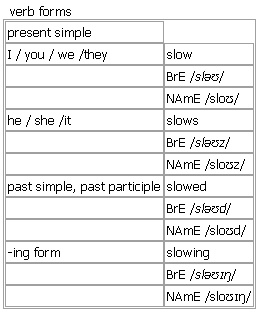|
Từ điển Oxford Advanced Learner 8th
 slow
slow

slow [slow slows slowed slowing slower slowest] adjective, adverb, verb BrE [sl…ô ä] NAmE [slo ä]
adjective (slow·er, slow·est) 
 
NOT FAST
1. not moving, acting or done quickly; taking a long time; not fast
•a slow driver
• Progress was slower than expected.
• The country is experiencing slow but steady economic growth.
•Collecting data is a painfully slow process.
•a slow, lingering death
•Oh you're so slow; come on, hurry up!
•The slow movement opens with a cello solo.
•She gave a slow smile.
•Average earnings are rising at their slowest rate for 20 years.
2. not going or allowing you to go at a fast speed
• I missed the fast train and had to get the slow one (= the one that stops at all the stations).  
 
WITH DELAY
3. hesitating to do sth or not doing sth immediately
•~ to do sth She wasn't slow to realize what was going on.
•~ in doing sth His poetry was slow in achieving recognition.
•~ doing sth They were very slow paying me.  
 
NOT CLEVER
4. not quick to learn; finding things hard to understand
• He's the slowest in the class.  
 
NOT BUSY
5. not very busy; containing little action
Syn: ‚Üësluggish
• Sales are slow (= not many goods are being sold).
•There are slow passages in which little happens, but they help to build up the suspense.  
 
WATCH/CLOCK
6. not before noun showing a time earlier than the correct time
• My watch is five minutes slow (= it shows 1.45 when it is 1.50).  
 
IN PHOTOGRAPHY
7. slow film is not very sensitive to light
more at be quick/slow off the mark at ‚Üëmark n., be quick/slow on the uptake at ‚Üëuptake
Word Origin:
Old English slāw ‘slow-witted, sluggish’, of Germanic origin.
Thesaurus:
slow adj.
1.
•a slow driver/walker/reader
•Progress was slower than expected.
gradual • • measured • • leisurely • |written unhurried • |written, often disapproving sluggish •
Opp: fast, Opp: quick
a slow/gradual improvement/change/acceptance
a/an slow/measured/leisurely/unhurried pace
slow/measured steps
2.
•They were slow in paying me.
late • |written belated •
Opp: quick
slow/late in doing sth
Example Bank:
•Filming was painfully slow.
•Genetic evolution is necessarily slow.
•He was noticeably slow to respond.
•I was considerably slower than the other drivers.
•My computer is noticeably slower than before.
•She is showing a slow and steady improvement in her reading ability.
•They are extremely slow at reaching decisions.
•I missed the fast train and had to get the slow one.
•Oh you're so slow; come on, hurry up!
•She wasn't slow to realize what was going on.
•We drove in the slow lane.
•a slow driver/walker/reader
Idioms: ‚Üëdo a slow burn ‚ñ™ ‚Üëgo slow
Derived Word: ↑slowness
 
adverb (slow·er, slow·est)(used especially in the comparative and superlative forms, or in compounds)
at a slow speed
Syn: ‚Üëslowly
•Could you go a little slower?
•slow-drying paint
•slow-moving traffic
• (NAmE)Drive slow!
see also ‚Üëgo-slow
Word Origin:
Old English slāw ‘slow-witted, sluggish’, of Germanic origin.
Which Word?:
slow / slowly
Slowly is the usual adverb from the adjective slow. Slow is sometimes used as an adverb in informal language, on road signs, etc. It can also be used to form compounds: ‚ñ™ Slow. Major road ahead. ‚óá ‚ñ™ a slow-acting drug ‚óá They walk very slow. In the comparative both slower and more slowly are used: ‚ñ™ Can you speak slower/more slowly?
 
verb intransitive, transitive
to go or to make sth/sb go at a slower speed or be less active
• Economic growth has slowed a little.
• The bus slowed to a halt.
•~ down/up The car slowed down as it approached the junction.
•The game slowed up little in the second half.
•You must slow down (= work less hard) or you'll make yourself ill.
•~ sth/sb down/up The ice on the roads was slowing us down.
•~ sth/sb We hope to slow the spread of the disease.
see also ‚Üëslowdown
Verb forms: 
Word Origin:
Old English slāw ‘slow-witted, sluggish’, of Germanic origin.
Example Bank:
•Bill slowed his pace to allow her to catch up with him.
•Economic growth is expected to slow.
•I was nearing West Road when the traffic slowed to a crawl.
•Rachel tried to slow her breathing.
•Sales have slowed down quite markedly.
•She very deliberately slowed her steps.
•Slow down a little!
•The flow of people into the building slowed to a trickle.
•The roadblocks hardly slowed them at all.
•The two of them had slowed almost to a stop.
•Time seemed to slow down as she fell.
 
|
|
|
▼ Từ li√™n quan / Related words
Related search result for "slow"
|
|
